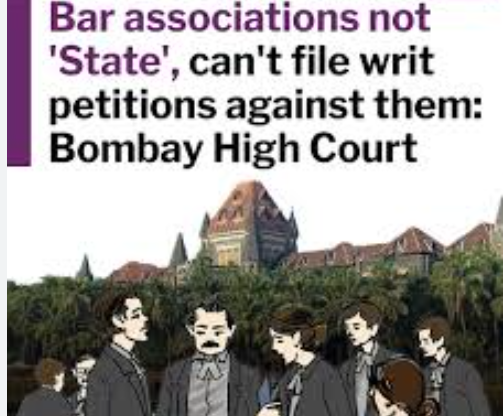
Bar Associations if held to be a “State” within the meaning of Article 12 of the Constitution of India, it would certainly lead to a “chaotic” situation, the Bombay High Court held recently.
A division bench of Justices Girish Kulkarni and Advait Sethna dismissed the petition filed by four advocates challenging the notice issued by the Kolhapur District Bar Association (KDBA), by which it asked its members to pay their membership fees by April 1, 2025, else they would not be eligible for casting votes in the upcoming bar elections.
The bench held that the bar associations are either societies registered under the Societies Registration Act, 1860, or trusts, they are governed by their own bye-laws or rules.
“Certainly, there is no deep or pervasive control of the Government or even of the Bar Council on the bar associations. They are governed by a managing committee which is elected by its members. There is hence, neither any control nor any interference of the Government in the functions of the bar association, much less on their elections or day to day functioning,” the bench held in its April 21 order.
The managing committee looks after the welfare of its members. The Bar Associations, in the interest of its members, day-in and day-out issue circulars, notices, notifications, etc, the judges noted.
“If all such activities, actions and decisions of the bar association are to be held to be subject, to the judicial review of the High Court under Article 226 of the Constitution of India, by reaching to a conclusion that the bar association is a ‘State’ within the meaning of Article 12 of the Constitution, in our opinion, this would certainly lead to a chaotic situation,” the bench held.
The State of Maharashtra has 36 districts, each district has number of talukas and each taluka is likely to have a bar association, which would be governed by their own rules and regulations, the court pointed out.
The judges further said that if they accept the petitioner’s contention that the petition be entertained, in such event any dispute whatsoever between the members and the bar associations, the High Court would be required to exercise its power of judicial review by entertaining writ petitions under Article 226 of the Constitution and adjudicate such disputes. “In our opinion, if we entertain writ petitions on such causes, things would not stop only at the bar associations formed by advocates, as the same logic would be required to be applied to associations of other professional bodies like the associations of Doctors, Chartered Accountant, Engineers to name a few, which also discharge duties towards its members and citizens,” the bench underscored.
Thus, it is a proposition too wide that a writ petition under Article 226 of the Constitution, be held to be maintainable, in regard to any inter se dispute between the petitioner and Bar Association, the judges said. “Even otherwise, the relationship between the bar association and its members on anything to do with the functioning of the bar association is circumscribed/governed and controlled by the rules of the bar association, to which the members subscribe, when they accept the membership of the bar association. If this be so, merely for the reason that the advocates are governed by the Advocates Act, a relief in a writ petition under Article 226 of the Constitution cannot be granted against the bar association. In our opinion this would be a position too farfetched,” the bench said. With these observations, the bench dismissed the petition.
Appearance:
Advocates Abhishek Nandimath, Shardul Diwan and Advait Vajaratkar appeared for the Petitioner.
Case Title: Abhijeet Bacche-Patil vs Bar Council of Maharashtra & Goa (Writ Petition 5368 of 2025)